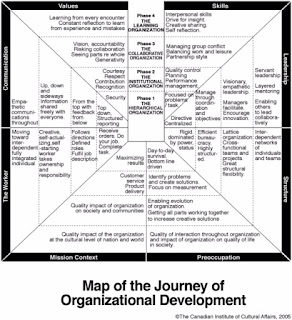The work of Learning and Development should focus on what is (now) difficult and valuable for businesses in the digital era
"Siloed departments, fixed roles and tasks, hierarchical structures, top down controlled strategies, action plans and funding mechanisms.
Our dominant ways of working aimed at optimisation and efficiency won't promote the adaptation and exploration required to work in complex situations."
John Hagel
Despite the layers of learning technologies I'd argue 'L&D' is still predominantly supporting the old industrial gods of optimisation and efficiency. Find a management problem. Develop a 'solution' to directly solve it. Measure (something / anything). Tell Management. (Realise Management have moved on to the next fire to fight and aren't that interested anymore).
Let's consider what used to be a differentiators in a successful business:
An efficient System; (fixed processes and procedures) that could be scaled, repeated and refined;
A 'growth strategy' formed from the particular experiences and values of a small leadership group at the top of the hierarchy;
Teams designed around specific accountabilities and responsibilities, executing through individual skills and job roles;
Effective methods for cascading 'performance' expectations and Management priorities down through the hierarchy;
Available, (willing?) workers, happy to execute a process;
Effectively measured and managed costs and supply chains to optimise and scale 'productivity';
(Productivity = more output from less input);
'Change' programmes and projects designed to drive process improvements in the system.
From an organisational learning perspective, the role of 'L&D' was to serve the existing System:
Identify and train the fixed skills required to execute the necessary processes;
Design 'learning' 'solutions' that demonstrated a clear line of sight back to the required performance (compliance) expectation of workers executing the System;
Measure 'learning' success through compliance and completion;
(Interestingly, much of this traditional 'L&D' approach followed the familiar and accepted industrial structures and bureaucratic language:
"Learning programme"
"Learning requirement"
"Learning framework"
"Learning delivery plan"
"Learning solution deployment"
"Learning delivery tracking"
"Learning success criteria")
And round and round it went. And for many L&D teams, still goes.
Of course, this approach reflected what used to difficult and valuable for hierarchy businesses in the industrial economy: efficient Systems, compliance to processes and workers' 'speed to competence'.
By comparison, reflect on what is now increasingly difficult and valuable in the disrupted, uncertain business and work contexts of the digital era:
Difficult today:
Developing and nurturing leadership and employee mindsets and social structures that can adapt and thrive in uncertainty;
Identifying and investing in new ways to approach customer opportunities and problems;
Balancing focus on existing processes with the space and time to look further ahead;
Creating psychological safety;
Creating the expectations and conditions that enable people to continually learn through and reflect from their daily work together.
Valuable today:
Better connections;
More diverse networks;
Trust in decision makers who are closest to the customer;
Enrolment of engaged, purposeful individual workers and teams who want to find new answers to solve problems; (not simply comply).
(PS. Here's model from way back in 2005 that still asks new questions of 'L&D' today...)
Paul works with L&D teams who want to refocus their efforts on what is now difficult and valuable in their organisations


Comments
Post a Comment
Please let me know your thoughts on this...